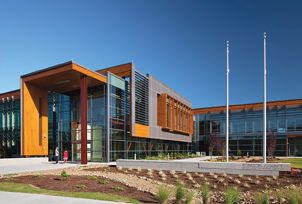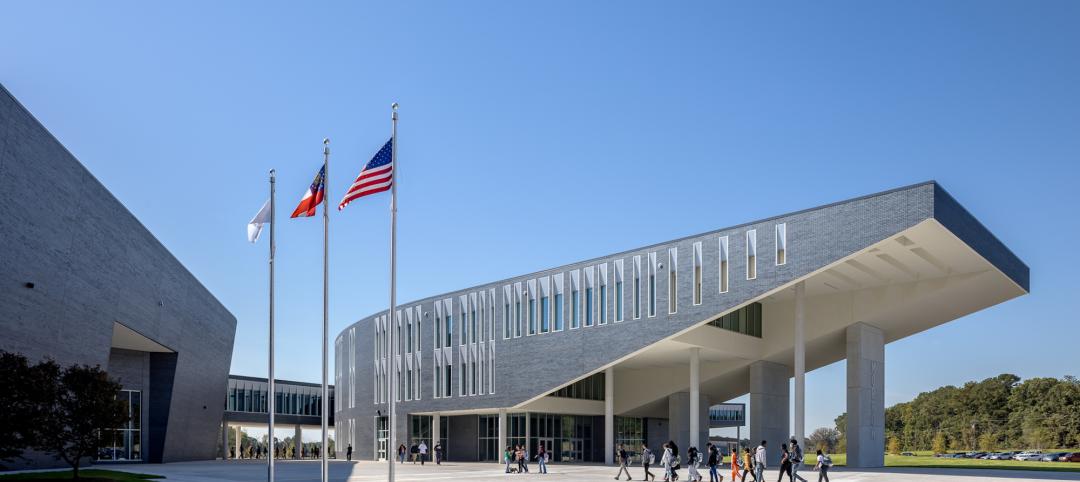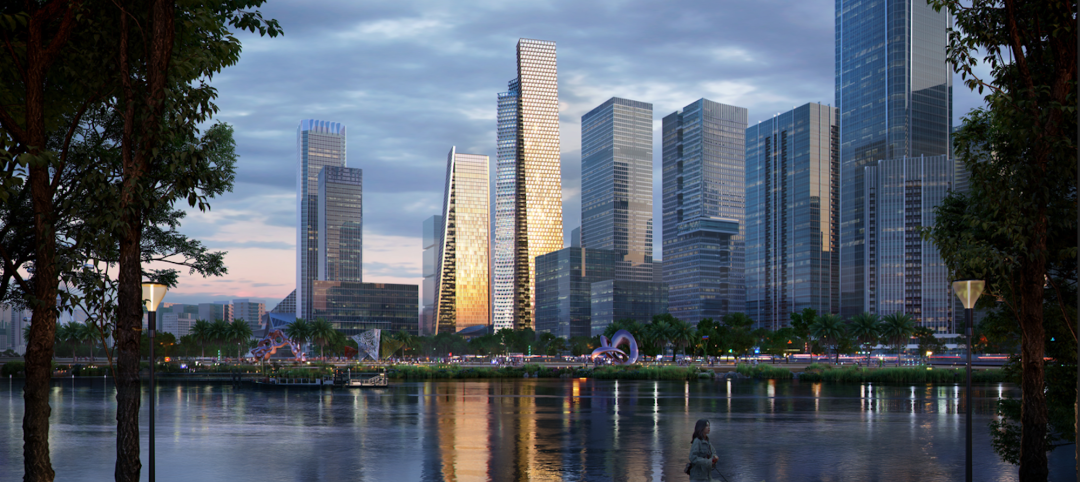Government work is scattered among dozens of federal civilian agencies, the Pentagon and the military branches, the 50 states, and tens of thousands of municipalities. The only thing these disparate entities have in common is a tight hold on their pocketbooks. With the federal stimulus having faded into the ether, and with state and municipal collections of sales and property taxes down, government construction at all levels will be slow to recover.“We’ll be lucky to see 2007 numbers by 2017,” says Margaret Bowker, Vice President, JE Dunn Construction.
Inside the Beltway, the GSA, the National Institutes of Health, the Naval Facilities Engineering Command, and the U.S. Army Corps of Engineers are still posting RFPs, but there’s a sense that “spending has been put on hold to wait and see the outcome of the election,” says Barry Perkins, LEED AP BD+C, Vice President – Government Construction, James G. Davis Construction Corp.“Certainly the size and type of projects has changed, with more smaller renovations and retrofits than larger new construction,” he says.
SCROLL DOWN FOR GIANTS 300 GOVERNMENT FIRM RANKINGS
“We’re showing up to prebids and competing against firms that never used to pursue city or county work,” says Dennis Thompson, Executive Vice President for Business Development, Manhattan Construction Co. “Competition has increased five- or six-fold, so you see an erosion of fees.”
The result: “You have the same firms chasing a smaller pool of projects,” says Len Vetrone, Webcor Builders’ Senior Vice President for Public and Federal Work.
MAKING THE ADJUSTMENT TO GOVERNMENT WORK
For newbies to federal work, learning how to work with the bureaucracy can be an eye-opener. When the economy went into the tank in 2008, Pepper Construction Group took on its first two GSA projects—the renovation of the Mies van der Rohe-designed John C. Kluczynski Federal Building, in Chicago, and the John Weld Peck Federal Building, in Cincinnati.
“There’s just an enormous amount of paperwork, forms, and protocols that are required on government jobs compared to our private work,” says Senior Vice President Rich Tilghman, PE. “We have high-quality teams with lots of experience renovating large buildings in the private sector, and GSA recognized that,” he says, adding that the $100 million in revenue for the two projects was certainly welcome.
Even firms with decades of federal civilian and military experience have to keep constantly attuned to client needs. Reynolds Smith & Hills has been designing and maintaining facilities for NASA for 50 years. Recently, the firm replaced almost 10,000 square feet of windows in the Launch Control Center at the Kennedy Space Center, a highly sensitive project. “NASA is a wonderful client, always looking for innovative solutions, but you have to create a low-risk environment for them,” says RS&H Vice President Richard Hammett, AIA, LEED AP.
Public-private partnerships are “starting to catch on” at the state and local level, says Webcor Builders’ Vetrone. “We’re talking to some of the cities we work for in California which have major public projects with no funding, looking at how P3 could make those a reality,” he says. A recently awarded P3 for a courthouse in Long Beach has attracted a lot of interest from the local AEC community, he says.
Manhattan Construction’s Thompson says privatization seems to be gaining traction with some federal clients. His firm is serving as contracting partner in such a developer leaseback scheme for a VA clinic in Grand Rapids, Mich., with U.S. Federal Properties.
SOME BRIGHT SPOTS ON THE HORIZON
Even with budget cuts, there will still be public-sector jobs for AEC firms. For example, Webcor Builders’ Vetrone reports “a fair amount” of aviation projects in California. “The big work at LAX and Sacramento has been awarded, but SFO still has a fairly aggressive program,” he says.
Manhattan Construction’s Thompson says some state and local government agencies may be rethinking their procurement policies because “service and delivery quality have been affected” by their reliance on super-low bidders. “The trend is back to technical qualifications plus low price, but at least it’s not just low price,” he says.
Vetrone says Webcor Builders is being “pretty selective” as to which government projects it bids on. “We’re looking for clients who want to hire on a best-value basis, whether design-build or CM at risk, where your qualifications, technical competence, and people count as much as your price,” he says.
More commissioning of government and military buildings could also be a godsend for AEC firms. “We’ve done enhanced commissioning for the Air Force, and we’re finding that the buildings have a marked increase in performance,” says RS&H’s Hammett. “If anything was a no-brainer, commissioning would be it.”
Portfolio optimization is becoming much more important to governments at all levels, as they seek to reduce overhead while improving employee productivity. “They’re looking for a trifecta—asset preservation, sustainability, and innovative workplace solutions,” says Becky Greco, Principal, HGA Architects and Engineers. Public-sector clients want to emulate the corporate model of “better, faster, more cost-efficient,” she says.
Lisa Bottom, a Principal at Gensler, agrees. “Government workplaces are moving away from a hierarchical structure and embracing an open plan” based on actual space usage and employee mobility patterns, she says. The goal: flexible offices that will meet current and future needs of the workforce at all levels of government. +
TOP 25 GOVERNMENT SECTOR ARCHITECTURE FIRMS
| Rank | Company | 2011 Government Revenue ($) |
| 1 | HOK | 143,334,571 |
| 2 | Heery International | 103,832,000 |
| 3 | SmithGroupJJR | 77,652,837 |
| 4 | IBI Group | 57,347,163 |
| 5 | Perkins+Will | 48,059,661 |
| 6 | HDR Architecture | 46,000,000 |
| 7 | EYP Architecture & Engineering | 40,892,580 |
| 8 | Skidmore, Owings & Merrill | 33,907,000 |
| 9 | HNTB Architecture | 31,338,712 |
| 10 | PageSoutherlandPage | 27,263,377 |
| 11 | NBBJ | 24,958,000 |
| 12 | LEO A DALY | 24,141,694 |
| 13 | Hammel, Green and Abrahamson | 24,028,000 |
| 14 | PGAL | 24,018,100 |
| 15 | Reynolds, Smith and Hills | 18,900,000 |
| 16 | ZGF Architects | 17,653,791 |
| 17 | RTKL Associates | 17,075,180 |
| 18 | DLR Group | 17,000,000 |
| 19 | Gensler | 17,000,000 |
| 20 | Moseley Architects | 13,700,000 |
| 21 | Beyer Blinder Belle Architects & Planners | 12,450,000 |
| 22 | Sasaki Associates | 12,356,441 |
| 23 | Cannon Design | 12,000,000 |
| 24 | KMD Architects | 11,913,372 |
| 25 | Fentress Architects | 11,830,262 |
TOP 25 GOVERNMENT SECTOR ENGINEERING FIRMS
| Rank | Company | 2011 Government Revenue ($) |
| 1 | AECOM Technology Corp. | 2,485,000,000 |
| 2 | Fluor Corp. | 1,127,862,000 |
| 3 | Jacobs | 924,100,000 |
| 4 | URS Corp. | 309,987,000 |
| 5 | STV | 133,396,000 |
| 6 | Stantec | 117,000,000 |
| 7 | Dewberry | 57,006,253 |
| 8 | Atkins North America | 43,330,846 |
| 9 | Parsons Brinckerhoff | 35,515,523 |
| 10 | H&A Architects & Engineers | 31,641,856 |
| 11 | Michael Baker Jr., Inc. | 30,830,000 |
| 12 | Science Applications International Corp. | 15,431,116 |
| 13 | Walter P Moore | 12,531,123 |
| 14 | Coffman Engineers | 12,400,000 |
| 15 | SSOE Group | 12,321,198 |
| 16 | WSP USA | 10,900,000 |
| 17 | Arup | 10,580,870 |
| 18 | TLC Engineering for Architecture | 8,528,328 |
| 19 | Sebesta Blomberg | 8,450,225 |
| 20 | Interface Engineering | 8,103,067 |
| 21 | Walker Parking Consultants | 7,887,763 |
| 22 | Simpson Gumpertz & Heger | 7,800,000 |
| 23 | KPFF Consulting Engineers | 7,000,000 |
| 24 | RMF Engineering | 7,000,000 |
| 25 | Wiss, Janney, Elstner Associates | 6,936,000 |
TOP 25 GOVERNMENT SECTOR CONSTRUCTION FIRMS
| Rank | Company | 2011 Government Revenue ($) |
| 1 | Turner Corporation, The | 2,268,320,925 |
| 2 | Jacobs | 924,100,000 |
| 3 | Clark Group | 850,491,577 |
| 4 | Whiting-Turner Contracting Co., The | 749,080,537 |
| 5 | Gilbane Building Co. | 736,199,000 |
| 6 | Hensel Phelps Construction | 669,080,000 |
| 7 | Walsh Group, The | 552,751,904 |
| 8 | Skanska USA | 550,758,448 |
| 9 | Webcor Builders | 484,567,966 |
| 10 | Tutor Perini | 385,311,000 |
| 11 | Balfour Beatty US | 341,774,742 |
| 12 | URS Corp. | 309,987,000 |
| 13 | Manhattan Construction Group | 274,683,334 |
| 14 | Alberici Corp. | 247,423,509 |
| 15 | PCL Construction Enterprises | 245,007,223 |
| 16 | Mortenson | 233,863,000 |
| 17 | Flintco | 223,200,000 |
| 18 | McCarthy Holdings | 218,000,000 |
| 19 | James G. Davis Construction | 208,000,000 |
| 20 | Yates Companies, The | 187,800,000 |
| 21 | Ryan Companies US | 156,858,437 |
| 22 | DPR Construction | 146,889,203 |
| 23 | JE Dunn Construction | 135,637,557 |
| 24 | Sundt Construction | 100,393,850 |
| 25 | CORE Construction | 94,340,532 |
Related Stories
K-12 Schools | Feb 18, 2023
Atlanta suburb opens $85 million serpentine-shaped high school designed by Perkins&Will
In Ellenwood, Ga., a southeast suburb of Atlanta, Perkins and Will has partnered with Clayton County Public Schools and MEJA Construction to create a $85 million secondary school. Morrow High School, which opened in fall 2022, serves more than 2,200 students in Clayton County, a community with students from over 30 countries.
Museums | Feb 17, 2023
First Americans Museum uses design metaphors of natural elements to honor native worldview
First Americans Museum (FAM) in Oklahoma City honors the 39 tribes in Oklahoma today, reflecting their history through design metaphors of nature’s elements of earth, wind, water, and fire. The design concept includes multiple circles suggested by arcs, reflecting the native tradition of a circular worldview that encompasses the cycle of life, the seasons, and the rotation of the earth.
Architects | Feb 17, 2023
Architect of the Capitol fired by President Biden after strong bipartisan criticism
Architect of the Capitol J. Brett Blanton was let go this week following alleged abuse of authority, misuse of government property, and wasted taxpayer money.
High-rise Construction | Feb 15, 2023
Bjarke Ingels' 'leaning towers' concept wins Qianhai Prisma Towers design competition
A pair of sloped high-rises—a 300-meter residential tower and a 250-meter office tower—highlight the Qianhai Prisma Towers development in Qianhai, Shenzhen, China. BIG recently won the design competition for the project.
Senior Living Design | Feb 15, 2023
Passive House affordable senior housing project opens in Boston
Work on Phase Three C of The Anne M. Lynch Homes at Old Colony, a 55-apartment midrise building in Boston that stands out for its use of Passive House design principles, was recently completed. Designed by The Architectural Team (TAT), the four-story structure was informed throughout by Passive House principles and standards.
Designers | Feb 13, 2023
Hoffmann Architects + Engineers Establishes Diversity Advancement Scholarship Fund
Hoffmann Architects + Engineers, a design firm specializing in the rehabilitation of building exteriors, contributed $25,000 to fund the Hoffmann Diversity Advancement Scholarship, administered through the Connecticut Architecture Foundation. The fund provides scholarships for students from underrepresented racial or ethnic groups who are seeking degrees in architecture or engineering.
Office Buildings | Feb 12, 2023
Smyrna Ready Mix’s new office HQ mimics the patterns in the company’s onsite stone quarry
Designed by EOA Architects to showcase various concrete processes and applications, Smyrna Ready Mix's new office headquarters features vertical layering that mimics the patterns in the company’s stone quarry, located on the opposite end of the campus site. The building’s glass and concrete bands are meant to mirror the quarry’s natural contours and striations.
Multifamily Housing | Feb 11, 2023
8 Gold and Platinum multifamily projects from the NAHB's BALA Awards
This year's top BALA multifamily winners showcase leading design trends, judged by eight industry professionals from across the country.
Multifamily Housing | Feb 10, 2023
Dallas to get a 19-story, 351-unit residential high-rise
In Dallas, work has begun on a new multifamily high-rise called The Oliver. The 19-story, 351-unit apartment building will be located within The Central, a 27-acre mixed-use development near the Knox/Henderson neighborhood north of downtown Dallas.
Sustainability | Feb 9, 2023
New guide for planning, designing, and operating onsite water reuse systems
The Pacific Institute, a global nonpartisan water think tank, has released guidance for developers to plan, design, and operate onsite water reuse systems. The Guide for Developing Onsite Water Systems to Support Regional Water Resilience advances circular, localized approaches to managing water that reduce a site’s water footprint, improve its resilience to water shortage or other disruptions, and provide benefits for local communities and regional water systems.

















